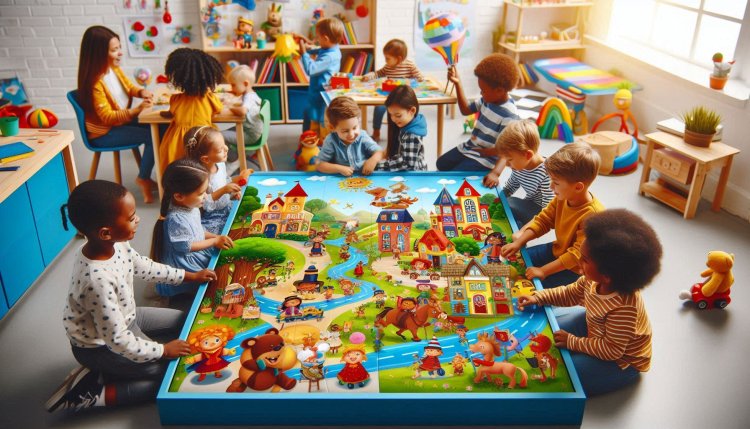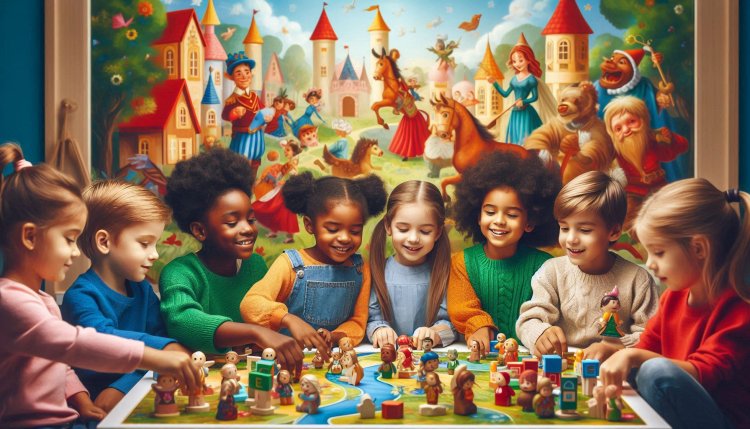Unlock Reading Adventures with PBS Kids Games: Super Why!
In today’s digital age, finding educational screen time that captivates young minds can be a challenge. PBS Kids, a trusted leader in children’s educational programming, bridges this gap with PBS Kids Games.
In today’s digital age, finding educational screen time that captivates young minds can be a challenge. PBS Kids, a trusted leader in children’s educational programming, bridges this gap with PBS Kids Games Super Why!—a collection of interactive, literacy-focused games designed to turn early learners into reading superheroes. Based on the beloved TV series Super Why!, these games blend storytelling, phonics, and problem-solving to empower children ages 3–6 to love learning. In this article, we’ll explore how these games work, their educational benefits, and why they’re a top choice for parents and educators.
What Are PBS Kids Games Super Why?
Super Why! is an Emmy-nominated PBS Kids show that follows the adventures of four fairytale-inspired characters: Whyatt, Red, Princess Pea, and Pig. Together, they form the “Super Readers,” a team that solves storybook problems using reading superpowers. The PBS Kids Games Super Why digital platform translates this concept into engaging, curriculum-aligned games. Available for free on the PBS Kids website and mobile app, these games help kids practice letter recognition, spelling, vocabulary, and comprehension through playful, interactive challenges.
By merging beloved characters with proven early literacy strategies, PBS Kids ensures that screen time becomes a productive part of a child’s learning journey.
Educational Benefits of Super Why Games
The Super Why! games are more than just fun—they’re rooted in research-based methods to boost literacy. Here’s how they help young learners:
1. Builds Foundational Reading Skills
Each game focuses on core skills like:
-
Letter Identification: Tracing letters and matching sounds.
-
Phonics: Connecting sounds to symbols (e.g., “B” says /b/).
-
Spelling: Assembling words to solve puzzles.
-
Reading Comprehension: Answering questions about story plots.
For example, in Super Why Saves the Day, kids help characters rewrite stories by correcting sentences or finding missing letters. This hands-on approach reinforces classroom learning.

2. Encourages Critical Thinking
The games present problems that require kids to think like the Super Readers. In Storybook Creator, children rearrange story elements to fix plot holes, teaching cause-and-effect reasoning and creativity.
3. Promotes Confidence
By overcoming challenges (e.g., defeating a dragon by spelling “FLY”), kids gain confidence in their abilities. The games celebrate progress with encouraging feedback, fostering a growth mindset.
4. Aligns with School Curriculums
PBS Kids collaborates with educators to ensure games meet Common Core and state standards for pre-K through 1st grade. This makes them a reliable supplement to school learning.
Top PBS Kids Super Why Games to Try
With dozens of activities available, here are standout games to explore:
-
Super Why Saves the Day
Join Whyatt and friends to fix broken stories by identifying letters, rhyming words, and completing sentences. Perfect for practicing sentence structure. -
Alpha Pig’s Lickety Letter Hunt
Help Alpha Pig (equipped with alphabet tools) find hidden letters in a vibrant world. Enhances letter recognition and phonemic awareness. -
Wonder Red’s Rhyme Time
Wonder Red’s rhyming magic turns words into objects! Kids learn word families (e.g., “-at” or “-og”) while creating silly rhymes. -
Princess Presto’s Spelling Play
Spell words to unlock Princess Presto’s musical spells. Focuses on letter sounds and blending. -
Storybook Creator
Kids become authors by editing classic tales. They’ll rearrange scenes, swap characters, and invent new endings, boosting narrative skills.
Why Parents and Educators Love PBS Kids Games Super Why
-
Safe & Ad-Free: Unlike many online games, PBS Kids Games offers a child-safe environment with no ads or in-app purchases.
-
Accessible: Free to play on smartphones, tablets, and computers.
-
Progress Tracking: The PBS Kids app lets parents monitor their child’s learning milestones.
-
Supports Diverse Learners: Games include visual, auditory, and tactile elements to cater to different learning styles.
“These games transformed my reluctant reader into someone who begs to play ‘letter detective’!” — Maria, parent of a 5-year-old.
How to Access PBS Kids Games Super Why
Getting started is easy:
-
Visit pbskids.org or download the PBS Kids Games app.
-
Search for “Super Why” in the games section.
-
Let your child explore freely—no login required!
The games are designed for independent play, but parents can join in to discuss stories and celebrate achievements.
Super Why Beyond the Screen: Tips for Offline Learning
Reinforce game-based lessons with these activities:
-
Create a Storybook: Rewrite a family-favorite story together, just like the Super Readers.
-
Letter Hunts: Find alphabet letters on walks or in books.
-
Rhyme Challenges: Take turns saying words that rhyme with “cat” or “sun.”
-

FAQs About PBS Kids Games Super Why
Q: Are these games really free?
A: Yes! PBS Kids prioritizes accessible education, so all games are free.
Q: What age group are they for?
A: Ideal for ages 3–6, though younger kids may enjoy them with guidance.
Q: Can schools use these games?
A: Absolutely—many teachers incorporate them into literacy centers.
Q: Do the games require reading skills?
A: No, they’re designed to teach reading from the ground up.
Final Thoughts
PBS Kids Games Super Why turn screen time into a dynamic learning experience. By blending beloved characters with research-backed literacy activities, they empower kids to embrace reading as an adventure. Whether your child is just learning their ABCs or starting to read sentences, these games offer a fun, stress-free way to build skills that last a lifetime.
Ready to unleash your child’s inner Super Reader? Visit PBS Kids today and dive into the world of Super Why!—where every game is a step toward reading success.
What's Your Reaction?





















